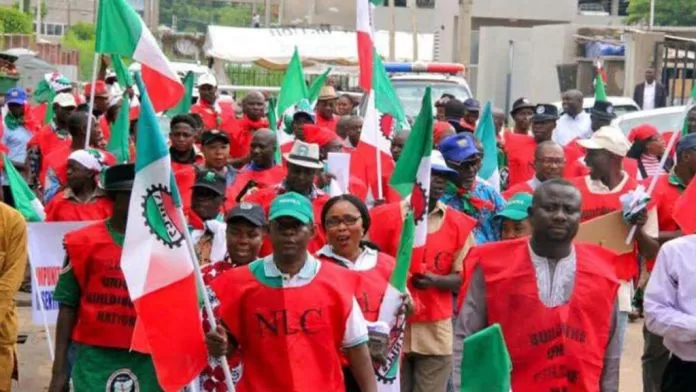INTRODUCTION
Labour strike – it can shut down businesses, disrupt supply chains, and have far-reaching economic and social consequences. But what really drives people to walk off the job? And how can labour disputes be resolved in a way that benefits everyone involved? Let’s explore the complex world of labour strikes.
Labour strikes are frequent occurrence in Nigeria, and they can have significant impact on the social and economic well-being of the country. What is labour strike?
A labour strike is a form of protest in which workers collectively refuse to work in order to achieve a specific goal, such as higher wages, better working conditions, or improved job Security.
Socio-economic on the other hand refers to the conditions of a population, including factors like poverty, income inequality, access to healthcare, education, and living standards. When labour strikes occur, they can disrupt the social and economic fabric of a community. This can lead to loss of income for workers, a decrease in productivity, and an increase in poverty levels.
Labour strikes in Nigeria are complex and multifaceted issue, with both positive and negative implications. This article explores the causes and consequences of labour strikes in Nigeria ,and focuses on the impact of labour strikes on the major economic sectors in Nigeria such as , income, employment, manufacturing, and agricultural sectors.It explores the factors that contribute to labour strikes, and discusses the consequences for workers, businesses, and the country as a whole.
MOST READ ARTICLES
History of labour strikes in Nigeria
The history of labour strikes in Nigeria dates back to the colonial period, when workers began to organize and protest against poor working conditions and low wages. These early strikes often faced harsh repression from colonial authorities, but they laid the foundation for a tradition of organized labour that continues to this day. In the post-colonial period, labour unions have played an important role in advocating for workers’ rights and improving living conditions for the working class.
In recent decades, labour strikes have continued to play a significant role in Nigerian society.
There have been a number of major strikes, including the General Strike of 1994, the Oil Workers Strike of 2003, and the Academic Staff Union of Universities Strike of 2022. These strikes have often been contentious, with both the government and the unions using strong-arm tactics to try to get their way. However, they have also resulted in some improvements for workers, including higher wages and better working conditions [1].
THE IMPACT OF LABOUR STRIKES ON MAJOR SECTORS IN THE NIGERIAN ECONOMY
Labour strikes have affected many areas in Nigeria’s economy including areas like income and employment. In the short term, labour strikes have led to a loss of income for workers who are unable to work during the strike. This created a ripple effect, leading to reduced spending and economic activity in the community. In the long term, frequent labour strikes have made it difficult for businesses to operate and create an unstable environment for investment. This have led to job losses and increased unemployment [2].
Labour strikes have also affected access to education and healthcare. When public sector workers like teachers and healthcare workers go on strike, it disrupts access to these essential services. This have caused a negative impact on students and patients, and have also lead to increased inequality. For example, the Academic Staff Union of Universities strike of 2022 resulted in the closure of public universities for several months, causing students to miss out on valuable education time. In addition, many low-income families were unable to access healthcare services that were disrupted by the strike [3] [4] [5].
The oil and gas sector is critical to the Nigerian economy, contributing over 90% of the country’s export revenue and over 70% of government revenue. As a result, strikes in this sector has created a devastating impact on the economy.
One of the most significant strikes in the Nigerian oil and gas sector occurred in 2012, when members of the Petroleum and Natural Gas Senior Staff Association of Nigeria (PENGASSAN) and the National Union of Petroleum and Natural Gas Workers (NUPENG) went on strike for several weeks. The strike resulted in a significant loss of revenue for the government and had a major impact on the economy.
Another significant strike occurred in 2016, when members of the Nigerian Union of Petroleum and Natural Gas Workers (NUPENG) and the National Association of Road Transport Owners (NARTO) went on strike over fuel subsidies. This strike also had a significant impact on the economy, causing fuel shortages and a rise in inflation [6] [7].
Another area is the agricultural sector. Agricultural production is a major contributor to the Nigerian economy, and strikes in this sector have a major impact on food prices and availability. In 2017, for example, a strike by members of the National Association of Nigerian Farmers (NANF) caused a major shortage of food supplies, leading to an increase in food prices and hardship for many Nigerians. Research Institutes’ Strike Affecting Nigeria’s Agric. Sector – Experts [8].
It’s also important to understand the impact of labour strikes on the manufacturing sector. In 2014, a strike by members of the National Union of Textile Garment and Tailoring Workers of Nigeria (NUTGTWN) resulted in the closure of many textile factories and loss of jobs.
The strike by the NUTGTWN had a number of causes, including low wages, the high cost of raw materials, and unfair competition from imported goods. The strike resulted in the closure of many factories and the loss of thousands of jobs. It also highlighted the fragility of the manufacturing sector in Nigeria, which is highly dependent on imported raw materials and vulnerable to global market conditions [9].
Many manufacturing companies rely on imported raw materials, such as cotton, synthetic fibers, and dyes. The cost of these materials is often high, due to a combination of factors, including a weak currency, high transportation costs, and tariffs. The high cost of raw materials makes it difficult for companies to compete with imported goods, and can lead to job losses and factory closures.
THE POSITION OF THE NIGERIAN LAW IN RESPECT TO LABOUR STRIKES
In terms of the law, the Nigerian Constitution guarantees the right to freedom of association, including the right to form or join a trade union. The Trade Disputes Act also gives workers the right to engage in strike action, subject to certain restrictions. Overall, the law recognizes the right to strike, but it also aims to balance this right with other considerations such as the public interest. Overview of relevant labour laws and civil rights in Nigeria.
Nigeria has several labour laws and civil rights regulations that govern the relationship between employers and employees, ensuring fair and just treatment in the workplace.
There are number of important laws and regulations related to labour and employment in Nigeria. The Labour Act of 2004 is the primary law on the subject, covering a wide range of issues. In addition, there are several other key laws, including the Trade Union Act, the Employees’ Compensation Act, the Factory Act, and the Minimum Wage Act. Each of these laws plays a critical role in protecting the rights and interests of workers in Nigeria [10].
More so, the Constitution of Nigeria provides a strong foundation for the country’s labour laws, ensuring that workers are protected and that their rights are respected. In particular, the Constitution’s guarantees of freedom of association and freedom of speech are crucial for enabling workers to organize and advocate for their interests. These guarantees, along with the right to a fair trial, help to create a system in which workers can exercise their rights and seek redress when those rights are violated. Here’s an overview of the causes, consequences, and potential solutions:
Causes:
Labour strikes are triggered by many factors, some of which are; wage disputes, unpaid salaries, poor working conditions, and government policies. These are all common causes of labour strikes. However, wage disputes is the primary driver of labour strikes. Workers may feel that their pay is not sufficient to meet their basic needs, or that it is not fair given the work they are doing. This can lead to frustration and a feeling of being undervalued, which can ultimately lead to a strike. Poor working conditions, such as unsafe or unhealthy work environments, can also lead to dissatisfaction and the desire for change.
Job insecurity, such as the threat of layoffs or contract non-renewal, can also lead workers to strike in an effort to protect their jobs.
Politically, unfair labour laws and policies can create tension between workers and their employers. Socially, discrimination, inequality, and a lack of representation can cause workers to feel powerless and disenfranchised.
Despite the disruption caused by strikes, they can also be an effective way for workers to stand up for their rights and improve their working conditions. Ultimately, it’s important to remember that labour strikes are complex issue with many different factors at play.
Strike is part of their bargaining tool. Striking is sometimes their last legal option [12]
Consequences
“Loss of revenue is one of the most significant consequences of labour strikes. When businesses experience reduced productivity and sales due to labour strikes, they also lose a significant amount of revenue. This have a domino effect, leading to reduced profits, increased debt, and even bankruptcy in extreme cases. Also, reduced investor confidence can exacerbate the loss of revenue, as investors may be hesitant to put their money into businesses that are experiencing labour unrest.
Furthermore, inflation is another major consequence of labor strikes.
As businesses lose revenue and are forced to raise prices to offset the costs of the strike, consumers may face higher prices for goods and services. This will lead to reduced purchasing power and an overall decline in living standards. In addition, inflation can be worsened by the effects of labour strikes on the supply chain, leading to further increases in prices. Together, these factors can create a cycle of inflation that is difficult to reverse [11].
Positive solutions
To resolve labour disputes, it is important to identify the root cause of the issue and consider possible solutions. Communication is key, and both parties must be willing to compromise and negotiate in good faith. Strengthening the legal framework and diversifying the labour market will help to prevent and resolve future disputes.
Similarly, skills development, transparency and accountability, and a crisis management plan can all play significant roles in resolving labour disputes. Skills development can help to empower workers and reduce their vulnerability to exploitation.
Transparency and accountability can prevent unpaid wages and corruption, while a crisis management plan can ensure that essential services are maintained during a strike. All of these solutions work together to create a more stable and fair working environment.
It’s important to note that addressing the root causes of labour strikes in Nigeria requires a coordinated effort from the government, employers, and labour unions to create a more stable and equitable labour environment.
Conclusion
While labour strikes can be disruptive and cause significant consequences, it’s important to remember that they are often the last resort for workers who feel they have no other options. By acknowledging and understanding the root causes, we can work towards more constructive solutions that benefit all parties involved and create a more just and equitable society, where workers’ rights are respected and everyone has a voice. Together, we can find solutions that benefit everyone and avoid the need for labour strikes.
[1]https://www.google.com/url?q=https://medium.com/%40TheBlkRepublic/a-short-history-of-strikes-in-nigeria 52d41c7491e3&sa=U&ved=2ahUKEwifv8KC_ZeCAxX9V0EAHSw6BwoQFnoECAYQAg&usg=AOvVaw2qgV3kr12cgLs66OjLoKM.
[2] https://www.ilo.org/africa/countries-covered/nigeria/lang–en/index.html
[3]https://dailytrust.com/five-major-ways-asuu-strike-is-affecting-students.
[4]https://www.google.com/url?sa=t&source=web&rct=j&opi=89978449&url=https://www.texilajournal.com/thumbs/article/Academic%2520Research_V ol%25205_Issue%25202_Article_01.pdf&ved=2ahUKEwj4ye3diZeCAxVzWkEAHVE_C24QFnoECAcQBg&usg=AOvVaw1bu6V8mohAI-jsSgD794rp.
[5]https://www.google.com/url?sa=t&source=web&rct=j&opi=89978449&url=https://www.premiu mtimesng.com/news/top-news/176152-nigerian-healthworkers-call-off-strike.html&ved=2ahUK EwiYlfD7iJiCAxXhQ0EAHQa_BsgQFnoECBUQAQ&usg=AOvVaw3tziCzikJO2k5ZJJ4rwTiZ
[6]https://amp.theguardian.com/world/2012/jan/12/nigerian-oil-staff-productionstrike.
[7]https://www.google.com/url?sa=t&source=web&rct=j&opi=89978449&url=https://www.bbc.com/news/business-30479898.amp&ved=2ahUKEwiYlfD7iJiCAxXhQ0EAHQa_BsgQFnoECBcQAQ&usg=AOvVaw12Vp9o8qZkgykkaia6avzF.
[8]https://dailytrust.com.
[9]https://www.google.com/url?sa=t&source=web&rct=j&opi=89978449&url=https://blueprint.ng/labour-threatens-nationwide-strike-over-minimumwage/&ved=2ahUKEwidwvSGjJiCAxXSnVwKHRrwAsoQFnoECBMQAQ&usg=AOvVaw0ElvKeVSLasSkKgWPHKhvS.
[10] https://www.google.com/url?q=https://en.m.wikipedia.org/wiki/Nigerian_labour_law&sa=U&ved=2ahUKEwji2taOlJiCAxW5UUEAHY7jACMQFnoECAEQDQ&usg=AOvVaw1Xxh5PInp0gt-tYV4euZN.
[12]https://www.google.com/url?q=https://actiondignity.org/news/why-do-workers-strike/&sa=U&ved =2ahUKEwi3kvTt2ZiCAxXCg_0HHVX7BbIQFnoECAsQDg&usg=AOvVaw2ksq6kTCvBC6JL6o_ Og-T8.
[11] https://www.google.com/url?q=https: //www.classace.io/answers/negative-impact-of-strikes-as-a-socio-economic-issue-on-businesse s&sa=U&ved=2ahUKEwja5LqLkZiCAxWJWEEAHeaxD78QFnoECAcQDQ&usg=AOvVaw3PLh_ ZpY1BGhHOKWlBhkaS.


